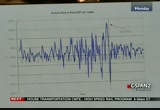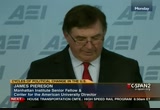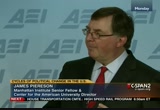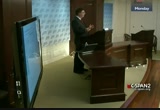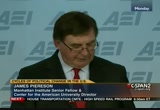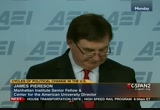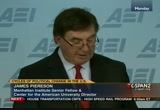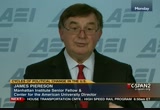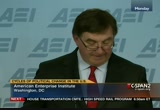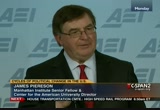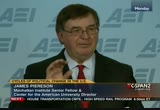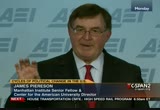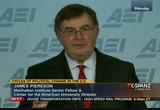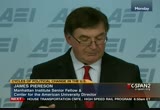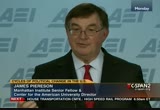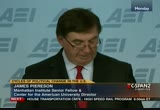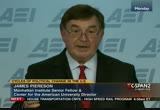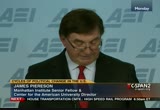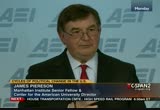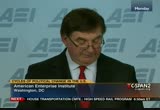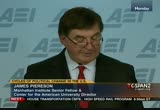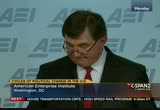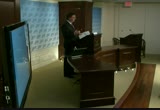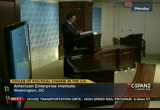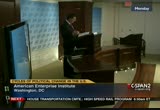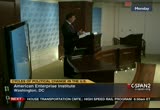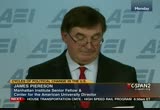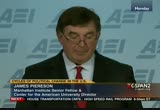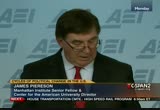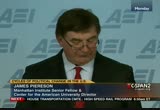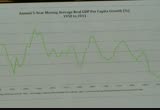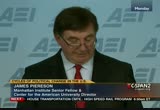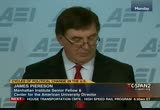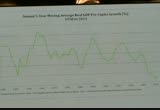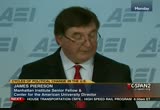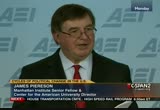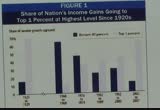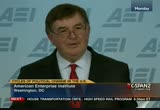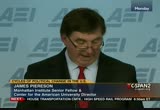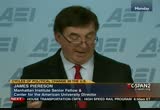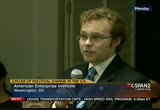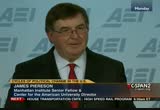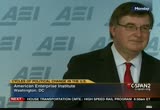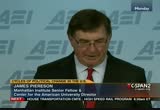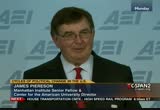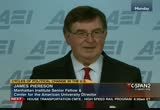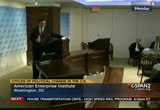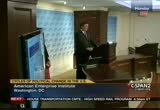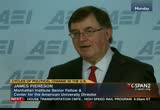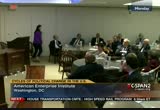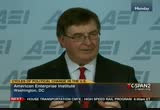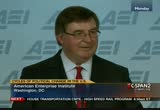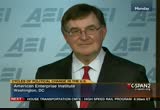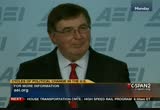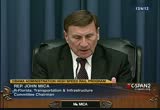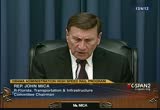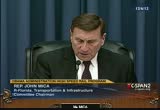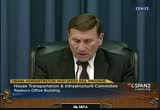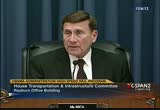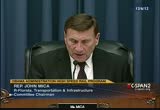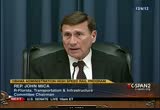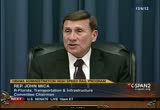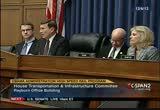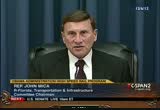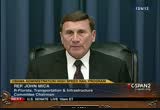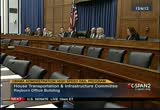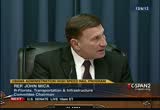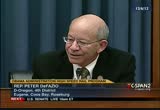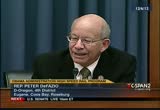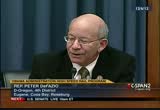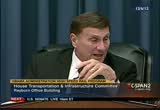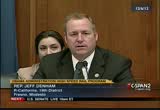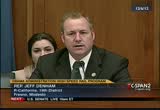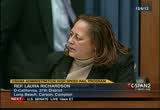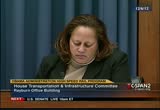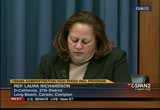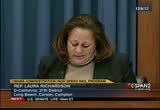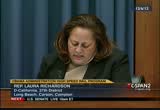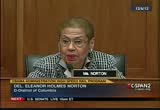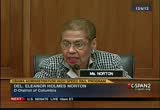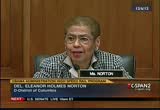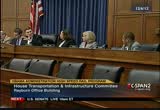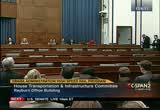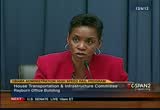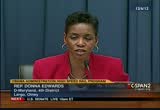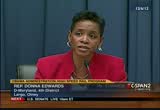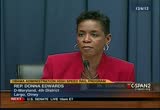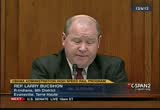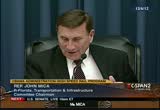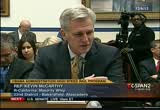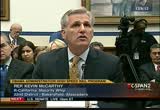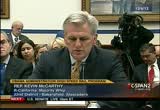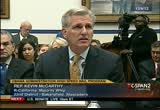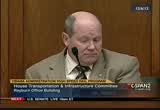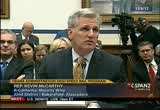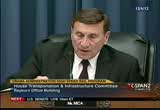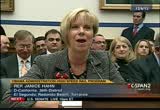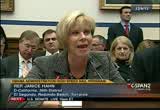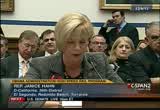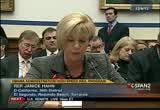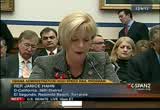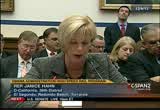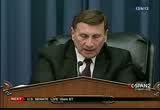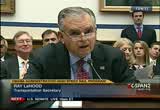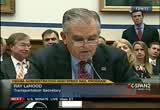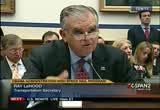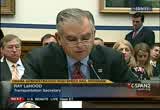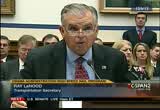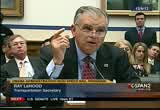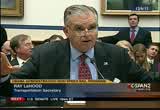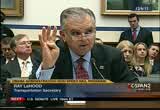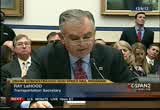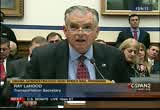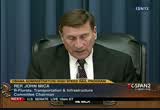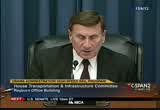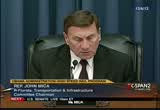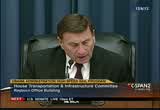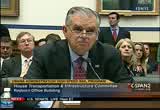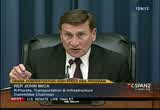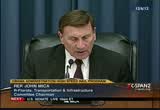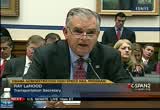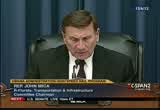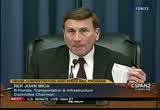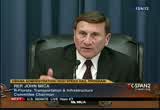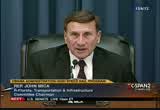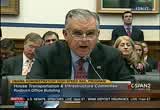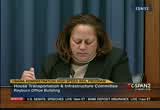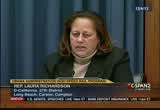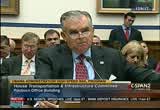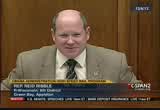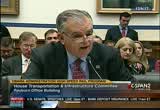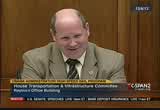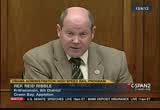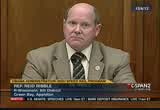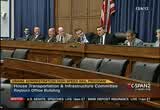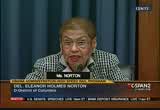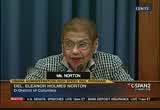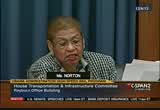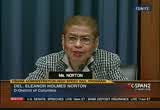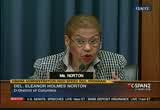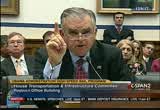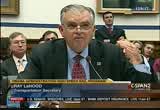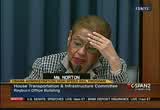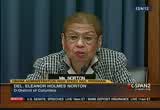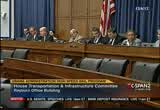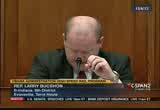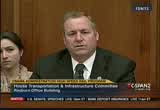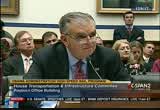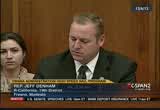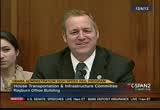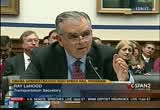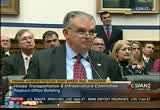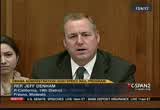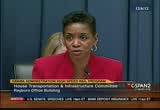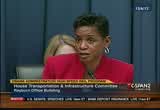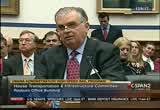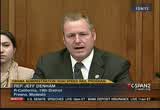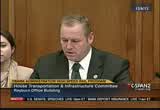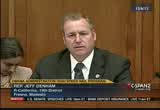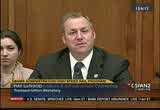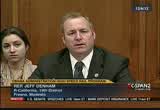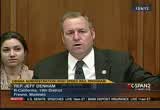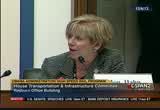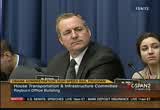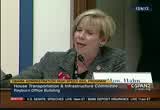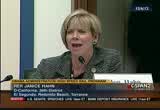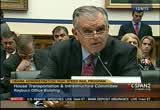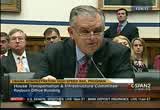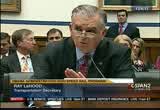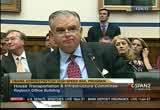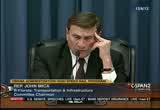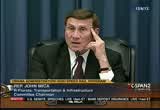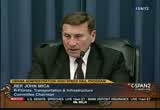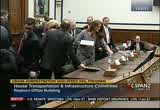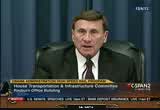tv Today in Washington CSPAN December 11, 2012 6:00am-9:00am EST
7:00 am
be looking at a reauthorization in the next congress and it is very important. let me say whether we abuilding high-speed rail, inner-city passenger rail, transit services, any kind of infrastructure highways you would not want to build the four lane highway where there are no passengers or vehicles with access that you would not want to build a city transit system where you don't have adequate capacity and passengers to use that facility, the same thing holds true anymore with passenger service. when i heard president obama and this administration, beginning to promote high speed rail, unfortunately most of the money, the $10 billion, does not go for
7:01 am
high-speed rail. they chose instead to support almost 150 projects and that number is growing and a lot of that money has been left behind. in fact, most of the money that has been read dedicated to high speed rail has been sent back by states including my state, the state of florida, we had to switch a proposal for high-speed rail, the actual speed was 84 miles an hour. 84 miles for one hour transit the distance of the proposed link in central florida, that is not high speed. high speed -- by our definition, 110 miles per hour average. that doesn't mean the train gets up to 110, 150, 116 miles for
7:02 am
some stretch. we are talking about the average speed. we are talking about a switch in ohio, looking at 39 miles to 58 miles an hour. that money was turned back. there was a similar proposal in wisconsin, that money was turned back. unfortunately, the beginning of the whole high speed effort in the united states has been somewhat of a setback for high-speed rail. the only route that has a possibility of being high speed is california. we have two california members we are going to hear from and we will go into details about california's progress but having visited out there, it does only service about 100 mile stretch and mostly in a rural area
7:03 am
without transportation interconnections that we need in mobile systems, we are serving major population centers but we will talk about plans and concerned about some of the direction of what is going on in california, plans to connect los angeles, san francisco bay area which are also traveling the reports we have on that. our intention today is really to try to work in a positive fashion to make sure high speed rail occurs in the united states. i tell people in florida, in my district and around the country that our number one goal should be, as you may know, amtrak bones, the government people own, have an interest in 600
7:04 am
miles of track between washington d.c. our nation's capital, philadelphia, new york city, boston, the most congested corridor in the united states of america, that is the only 600 miles that we really own. we another small stretches around the commuter -- all the rest of amtrak service, over 20,000 miles of private freight rail. i see the main rail people in the audience and they have concerns too about using theirs and not having dedicated them and we need to address that issue as we move forward. final point is northeast quarter is where we should be putting the focus. give the administration credit for at least taking the money that has been turned back dedicating so that to the northeast quarter but we are
7:05 am
doing it in a piecemeal, half baked fashion. the northeast corridor, every state, every major area can benefit by bringing high-speed rail to the northeast corridor. 70% of our air traffic delays emanate from the northeast corridor even when we have next-generation air traffic control, move planes faster and closer together with doubling of air-traffic, all of the other restrictions we have in that corridor, you must have high-speed rail to serve that harry and it has connections to service one of the most congested corridors in the united states of america. next week, our final hearing will be a hearing that will hold
7:06 am
out the northeast corridor. our first hearing on a snowy day in january when i became chairman of grand central station, new york city and conclude our final hearing of the session dealing with progress or lack of progress in the northeast corridor next week and our hearing will focus specifically on the northeast corridor. with those comments again a strong supporter because of energy, environment, congestion, still remain dedicated to moving positive inner-city passenger rail and particularly high-speed service if the united states is falling further behind and instead of being behind, those brief comments, patient ranking member who was so nice to me
7:07 am
yesterday. >> thank you, mr. chairman, the minority -- [talking over each other] >> i can tell you i'm going to hang. >> nothing can move don young from the center. >> that is the size of that. it takes five people to move it. >> that is right. >> thank you, mr. chairman. chairman, i have been involved in the issue of high-speed rail since early on in my career in congress in nearly 90s, on the appropriations committee, designated the first proposed high-speed rail routes in america and one of them was from eugene, ore. british columbia, and we will hear a little later from paula hammond who is secretary of transportation from washington who will describe our progress or lack mara of, small amount of progress in achieving
7:08 am
7:09 am
hyundai motor first segment from madrid to the coast and had a chance to ride on it and they said we want that too and now have a system that moves people fairly long distances fairly quickly, has changed real-estate market, businesses, has been a tremendous boost for the economy but this is major changes for them that have been beneficial, and similarly you could find that in places like california with extraordinarily high prices in urban centers with high-speed rail, people could live even
7:10 am
further out than they do now and get their economically and environmentally responsibly. i look forward to discussing problems and the improvements we can make and what the future will look like. i regret i have to go to a meeting to get all my freshman on to committees, i am looking forward to a lively exchange from california which i know is lively and would love to hear from secretary ray lahood but i will have to step out. easily followed by others who take the place. >> thank you, a he is a great partner, i appreciate all of his work. i want to thank you, we took the united states through 9/11, very difficult times together. >> don't mention gsa please.
7:11 am
i always refer to that as my bastard child and you helped in the conception. >> don't even want to go there. >> i think we are going to have of lively one because it has mr. denham from california. you are recognized. >> thank you, i will take the opportunity to make a quick statement. always look forward to talking about high speed rail in california because there's always something new to talk about. this is something i supported when i was in state senate, a $33 million project going to the ballot initiative to borrow $9.5 million. when we had a decent credit rating. since then our credit rating has been downgraded. the debt has gone through the roof to the point of near bankruptcy in this plan we once had, has no plan.
7:12 am
i went $33 billion to $98.5 billion with no private investors to pay for it, no funding from the federal government to pay for it and unable to fit the $9 billion bond that voters passed and voters are saying no thank you, put it back on the ballot so we can end the project once and for all. there are a lot of things we like in california and a new shiny train would be one. it would be fun to have but the question is you have to ask yourself can we afford to have something fun, can we afford a luxury and can we afford to do it with no plan? my questions will center around where does the $98.5 billion come from and if it has been reduced to $68 billion where are these new ridership numbers coming from the have no justification and i want to see something that shows we have a budget that is going to be done on time, not over several decades and one of the things
7:13 am
promise not only to me as a member of central valley but the entire state was this is going to be done on up preplanned corridor that is going to stay off of not only valley number one industry but state number one industry and if we continue to disrupt our industry we will continue to lose our number one industry. with that i yield back. >> the gentlelady from california, you are recognized. >> thank you. i can't claim to be the bastard child but i will be a good cousin for you. thank you, chairman and ranking member, i would like to acknowledge mr. denham, i traveled with mr. denham and john mica to the central valley to look at this issue and we do not agree on the ultimate thoughts of your perspective of this project, you have been very
7:14 am
conscientious in wanting to do what is best for central valley and hope to provide you with that plan, the secretary being here and others to get it done. today we are here to discuss the high speed and inner-city passenger rail opportunities and are also want to acknowledge secretary ray lahood who has come to answer our questions and want to make sure we are well informed, thank you for that. as a member of the railroad subcommittee and co-chair of california high speed rail caucus and vice chair of the bicameral high-speed rail caucus the development and implementation of a national high-speed rail system is one of my highest priorities. china is offering 13 types of railways and has 20 under construction. by 2020 this network will cover nearly 10,000 miles.
7:15 am
when i looked at the title of this hearing about what mistakes have been made it seems to me one of the number one mistakes is our lack of continued commitment to high speed rail in providing adequate dollars to be able to have a true system in the united states. not only are we not investing in alternative to highway system that we are spending it on band-aids for infrastructure rather than investing in the top tier system. our president has taken bold steps and the secretary has carried that flag with us but we must provide the support to provide the additional dollars that are certainly going to be needed as mr. denham reference to get the project going. when you consider the amount of money spent on gasoline, aging infrastructure and all of the changes, certainly high speed rail must be at the forefront and when you consider federal reserve bank of san francisco reference the infrastructure investments it is a good thing for the buck in the sense that
7:16 am
the dollar's increase by the output of each dollar we are spending is significant and should be done. when you consider california is the ninth highest gdp in the world, first in the united states and represents 12% of the country's population, certainly when others before, generations before considered trains going west, we shouldn't be hesitating and insisting upon only one way when we know the opportunities in california. some portions of california offer the landscape that makes it a true high-speed rail possibility similar to france and china and our chairman alluded to that. the recent da 0's larry assessments shows that california high-speed rail has secured $11.5 billion from federal lands state and still needs a shortfall of $57 billion to move forward.
7:17 am
to put this in perspective, in the 1950s congress had action to invest in infrastructure and create an interstate system. the initial system took 35 years to build and after several additions highway system is a total length of 47,182 miles. the cost of construction has been estimated at $425 billion in today's dollars. so certainly we should move forward at this time. in urban mobility report by texas transportation institute found the cause of slow speed, what we currently have, on delays, and misconception continues to cost the united states over $100 billion annually. now is the time to make that investment for alternatives to congested highways and simultaneously create jobs. inner city passenger rail service call one of those
7:18 am
alternatives, for delays on crawling speeds that face the nation's inner state today. northeast corridor and california high speed rail should be treated as the first step to developing the nation's high-speed rail network. i want to thank our witnesses and look forward to your testimony. i yield back. >> i don't -- if so, i would not be surprised about high-speed rail. >> it will be on the northeast corridor and i might save a little bit -- [talking over each other] >> that will never go away. mr. chairman, a pleasure to work with you on that matter.
7:19 am
i don't know about california and other places where high-speed rail may be controversial but i do know where we are furthest along and all i can do is see us get started so the we can do this, created the american railroad system with considerable help from the united states government during the civil war, private and public officials, the magnets hutu government money and ran with it. they would be serving to see how far behind we are developed and developing countries on high-speed rail and the single example of high-speed rail in the united states should be an for me is a matter of personal
7:20 am
embarrassment as an american citizen, the district where we have the hub of amtrak, amtrak is already, redesigning to accommodate a high-speed rail, already dealing with the infrastructure and in the northeast corridor is where we already have the fastest train. i don't want to engage in a competition with the rest of the country and our interest and the stimulus package trying to catch up with countries around the world, funded high-speed rail in various parts of the country but i know that milestones which you
7:21 am
are not going to look up the entire country on high-speed rail by just staying on your mark, here we go and i don't think we will be able to avoid prioritizing where the money goes, piloting it because we have not done it and i am not convinced we know how to do it. because we haven't done it and to avoid making mistakes throughout the country of having no model to study, i hope we will let me start where we already have started on the northeast corridor. somebody in the southeast and california, anywhere in the united states, they can do it faster and their model is ready, and i will concede, just let's get started. thank you, mr. chairman. >> i also thank her for 15
7:22 am
years, having union station, a true intermodal center, used to have people come to the greyhound station, drag their luggage to union station, we used to go around town to take a bus, and some satellite location and 15 months we have got that done and dedicated, came up for that during a very heated election but i thank you for your leadership. not this secretary but deputy secretary was instrumental in thanking the nation's capital having a true intermodal, like most of you. >> i want to thank our witnesses for being with us and i want to thank secretary ray lahood. it is your birthday. i would not have chosen to spend
7:23 am
my birthday with you but glad you have chosen to spend your birthday with us. particularly to the chairman for holding this hearing and discussion -- a week and half ago to go to new york, bless amtrak forever, even on the assumption, and i do share your view, we have a densely populated corridor in the northeast, that requires no bust development of high-speed rail, and i don't think it should be at the exclusion of development of high-speed rail in other corridors in the country. when i think about a trip by took many years ago from -- with my son from paris to the jordan region of france and it was
7:24 am
going from densely populated urban area to a role and mountainous region and high-speed rail wasn't included from there, and areas around the central coast that is true of the of the other areas of the country and for us to be competitive is absolutely necessary. we know of course, we don't have the phrase here but we know that the investment in high-speed rail and infrastructure will pay off in terms of thousands and thousands of jobs and it will pay off in terms of making us more competitive. if a worker is going from boston to washington d.c. and have so many more options for work for employment, employers can have many more options if their employees could make it today
7:25 am
commute. we need to get started and there has been so much discussion on this committee with the stimulus package and i really have to question why it is members of congress are so headstrong against high-speed rail in some corridors when it was their governors and state legislatures that wanted the high speed rail dollars and yet they have rejected, rejected that. i have to say in maryland we were beneficiaries when florida when through its own rejection. i am grateful for that. i don't think it was particularly smart. and how we can get off of the dime. sometimes there is great resistance to change and that requires somebody to punch through with vision and i am sure, i know this is true, over
7:26 am
a time when the interstate highway system was being developed there were areas that we don't want the highway. who doesn't want off highway now? there have been other occasions even with our own metro rail in this region i can think of communities i represent, i don't want metro coming to our district. it will keep people out. they are begging for metro. i spent an hour and a half commuting 8.6 miles. all across the country we have a need to to get our work done and many in the freight rail industry, we would be more efficient if we ridge sharing tracks and infrastructure with passenger rail system so let's get this right, send the money we need to spend and let's
7:27 am
consider that an investment and the payoff may be not for us but a couple generations and with that i yield. >> gentleman from indiana. >> i will make a few comments. i am from indiana and never get high-speed rail bed in my observation, recently with the ongoing interstate project through my district, trying to get a highway to indianapolis i see some of the same steppingstones high-speed rail has and some of the discussion needs to revolve around the impediments other than money that are stopping these projects. the reality is there are environmental issues, ongoing lawsuits for years, sometimes decades, right of way egis, ongoing lawsuits, sometimes for decades that cost people so much money that the question is
7:28 am
should the federal government continue to funnel money to projects that are going to take two decades, three decades, if we are not going to address some of the drivers of the ongoing cost, interstate 69 visible different from building high-speed rail but it is through new terrain. the started thinking about this in the late 1960s and i would argue the interstate highway system we need to build that today we couldn't build it. with my two years on this committee and being too a number of hearings, i am in favor of it, a lot of areas make sense but we need to address these issues, i yield back. >> thank our two first
7:29 am
witnesses, member panel for perseverance and they get first choice, and members mr. mccarthy -- and others, if they choose to be permitted to sit with the committee at today's hearing an offer testimony and ask questions, without objection, so ordered. you are welcome to join us after words. you will be at the end of the pecking order to ask questions and you have in toward very well so far. with that we welcome two colleagues from california, kevin mccarthy, janice hahn, we recognize mr. kevin mccarthy first. >> thank you, mr. chairman. i want to thank you for your commitment. ..
7:30 am
7:31 am
quickly, the best ways possible. what you want you also need a plan for, a plan that works, a plan that is tested, a plan that is audited and a plan that has a review. i happen to come from california, i happen to sit in the area that many of you talk about. it's going to be part of again. and i have real doubt -- [inaudible] this will ever be built. that's why i joined with the chairman, mr. denham, mr. miller, mr. hunter when we sent the letter to the gao asking for an audit and review of the business plan in california. i'll look forward to hearing their testimony later and looking and reading the report when it's completed. to date, the project in california has been the biggest recipient of federal money, billions of dollars.
7:32 am
there are concerns about the business plan itself, and equally concerning to me just because we've invested money doesn't mean we have to invest more. the current plan to be finished at the smallest level of number asks for another $38 billion from the federal government. please put that in perspective. the debate rahs ling over on the fiscal cliff, if you raised all the dollars and taxes proposed, you only get $31 billion in a year, and they're requesting more than what we'd even get from that. so we need to be good stewards. yes, we want movement, yes, we want it to work right. before we make an investment again, shouldn't we review the business plan? secondly is an issue that
7:33 am
mr. denham raised. this was put before the california voters. yes, it looks different today. as a california voter, i personally think you'd have to go back to the california because it's not what was proposed. it said there'd be private funding. there is no proposed private funding as of today. there's no money in, and i question whether it'll be in the future. so does the federal government -- is the federal government now on the hook for the rest of the plan which the voters were asked for and said would come? if we are the biggest funders of this, why would we not -- [inaudible] to what they said they would do? that is a question we all have to do. thirdly, when you read the business plan and you live in my
7:34 am
area, the numbers just don't add up. the millions of people that they project will ride the train from my area are nowhere near the population that will do it. there's roughly 750,000 within the -- they currently take a train or an airplane to the region in which they're going to serve. so is your investment going to pay off, or are you making a an investment where you're going to have to continue to invest and subsidize the riders to be on the train themselves? california first brought this issue up when we had a surplus. many people realize in a government when you have a lot of surplus, you start picking up big dreams. you want to do a lot of different things. ings that not the same perspective of where california is today, and it is definitely not where the federal government is today.
7:35 am
so our stewardship has to analyze the business plan, analyze the numbers and also puerto on the table -- also put on the table maybe this is the time we cut our losses. maybe we say, no, we're not going to fund any more, and the savings should go to pay down our deficit. look, i know hollywood happens to be in california, but this is not a kevin costner movie. if we build it, i don't know if they will come. and that is not how we may with taxpayers' money. it's right to have this hearing, but it's right to scrutinize, and before we move forward on anything, the legislative -- [inaudible] and the review have the same questions of the business plan. we should even ask more. because it wasn't their money, it's the taxpayers' money that we're responsible for investment, and that's the review we need. i yield back. >> thank the gentleman. pleased to recognize ms. hahn,
7:36 am
gentlelady from california. >> thank you, mr. chairman, thank you, members of the committee. thank you for allowing me to participate in this hearing today. i've only been in congress about a year and a half, but my whole life i've been deeply involved in transportation issues, particularly in my capacity on the los angeles city council for ten years. and so my dad who was an l. a. county supervisor for 40 years in l.a. county took my brother and i have to world's fair in 1960 which was held in seattle. my of you probably -- many of you probably weren't born then. so there was this modern
7:37 am
monorail project that ferried people around the world's fair. and the investors of that project at the time offered to build that monorail system as a pilot program in los angeles reversing the harbor freeway. dad thought it was a good idea but couldn't got any of the other -- get any of the other city fathers or county fathers to agree that this was a good investment. nobody at that time thought we could everyone get people out of their beloved cars. so that monorail now circles disneyland's magic kingdom in anaheim constantly. but that's a reminder to me that the biggest mistake i think we've made so far is not building major transportation projects that the public can
7:38 am
use, will use and will get them out of their cars. you know, in california i believe and i think the voters have proved that time and again that high-speed rail will reduce congestion, it will create jobs, and it will modernize the entire state's rail system. it will reduce congestion which is a key issue for californians. transportation congestion is strangling the business potential of our state and weighing down the economic activity that isn't just critical to the success of california, but to the nation as a whole. if any of you have ever driven on the freeway between los angeles and san diego, it could take anywhere from two to four hours in traffic. turning to aviation, there's delays there as well. flying between los angeles and san francisco in theory takes only an hour, but one out of
7:39 am
every four flights between los angeles and san francisco, the busiest short hall market in the united states -- short haul market in the united states, are late by close to an hour or more, and that doesn't even include the time it takes with air travel and going through security. our transportation network is already overburden withed, and that's long before you start factoring in the projected increase in travelers in california. but in many cases there is no physical space to expand a freeway or build a new runway to take into account all the projected growth and travelers. in many cases the communities do not want to expand their airports. the community surrounding lax is already mobilizing against any expansion. as the population grows, we need to construct new transportation options to reduce congestion, options that won't just continue to patch our existing system, but break open a new
7:40 am
transportation future. i think high-speed rail is that option. second, there's no doubt that high-speed rail is a job creator. at a minimum, the construction project will create 20,000 jobs each year for five years. this is agreement for -- great r the state of california which was certainly hit hard by the recession. and that 20,000 is before you factor in the jobs that this new system will ultimately generate. third, the plan will modernize the state's rail system. they've created a blended system that will begin construction on high-speed rail while improving other rail systems throughout the state. this will allow for the high-speed rail system to connect the inner city and regional rail systems called the book ends, and there are activity funds throughout california including caltran's positive train control and los
7:41 am
angeles metro link upgrade in my part of the state. this railroad will get needed upgrades and swap out diesel engines for an electrified system that's cleaner and faster. high-speed rail would not happen without federal government support, including legislation passed by congress to authorize this program. the united states is going to maintain our position of economic leadership, we have to invest in the best infrastructure in the world. that will not be true if we do not invest in high-speed rail. we cannot wait until our highways are completely congested to think of other long distance transportation options. we need to catch up to germany, france and japan. just heard this morning that japan is celebrating their 50th anniversary of their bullet train. we cannot allow china to surpass us in our next generation of infrastructure. tourists from across the world will visit our high-spieled rail
7:42 am
to marvel at our engineering and technological prowess. this is not just about transportation, but about changing the revitalization along the cities and routes. in conclusion, it's clear that i support the high-speed rail in california. the federal program will help make it possible. what we need now is vision, what we need now is leadership, what we need now is a belief that the people of california and this country want us to invest in this type of transportation option. thank you, mr. chairman. i yield back my time. >> thank you. i thank you both the members for joining us, and you're welcome now to join us be you'd like and stay for questions. we'll excuse you at this time as we bring secretary lahood up who's our next witness. our second panel, because this is the secretary of transportation, former member of this panel, distinguished
7:43 am
secretary of transportation who we've had a chance to work with, appreciate his cooperation and efforts and also delighted to have him here on the anniversary of his birth. welcome, secretary lahood, and you're recognized. >> be mr. chairman, let me begin by congratulating you on a job well done as chair of this committee. i served when i came here with bud schuster who was the chair, and i heard every -- all of jim overstar's lectures as you have over a long period of time. and what you've been able to accomplish in a very short period of time as chair of the committee, i think, is extraordinary. a transportation bilker probably not as long as either one of us wanted, but it's a good bill. an faa bill, it is a good bill.
7:44 am
and we couldn't do the work that we do without the leadership of this committee and your chairmanship over the last time that we have been together. so you've done a lot, and you have a lot to be proud of. and we haven't agreed on everything, but we've agreed on most things, because we agree how important transportation is for america. and i just, i want to offer my words of congratulations to you. and i also want to say a word as a former staffer of 17 years around here. jim coons and his team really did a good job on both bills and on a lot of other things. and i know jim is moving on to bigger and better things, but to all of the staff that work on this committee, you're the ones that do the work, and we appreciate all of you also. so to the chairman and the ranking member, i'm delighted to
7:45 am
be here. president obama's high-speed and inner city passenger rail program is bringing more transportation options to millions of people. we're creating jobs and supporting economic growth across the country. high-speed rail and higher-performing passenger rail are critical to america's future. by 2050 our country will be home to 100 million more people. right now our highways and runways are already congested. i don't have to tell any of you that from any of the communities you come from. this congestion will only grow with time. we can act today, or we can face a transportation crisis later. investing in rail is a priority for president obama and this administration. and most importantly, it's a priority for the american people. since 2009 we have received 500 applications. in your statement, mr. chairman,
7:46 am
you acknowledged two or three governors who turned down the money. since -- during this period of time we have received 500 applications for the money that was turned back from florida, $2.3 billion, we had $10 billion of requests for that money. the idea that people don't want passenger rail? they do. we have the statistics. but we have the people to tell us this. so let's look at the progress we've made. as a result of this administration's investment, the nation's first true high-speed rail system is set to break ground this year. this 220 mile-per-hour train system carry travelers from los angeles and san francisco in less than three hours, more than twice as fast by interstate. california will have high-speed, true high-spieled trains.
7:47 am
speed. we have introduced and are now expanding 110 miles per hour service, and as you indicated, mr. chairman, the law says that's high-speed trains. in october i rode on a train for a very short stretch as a result of investments we made in illinois; chicago/st. louis corpserer, and i saw the progress myself. i also recently visited a plant in rochelle, illinois, that is building 130 rail cars and creating about 250 jobs in the process. these are cars that are being ordered from california and other places. these are american jobs, american workers building america's train sets. that's what this is about. this rochelle plant did not exist before president obama initiated a high-speed rail program. and when i was there that day, i not only spoke to 250 employees,
7:48 am
they're talking about building another facility there as a result of the vision that this administration has for passenger rail. this is about jobs. and it's not just the future. these jobs exist today as a result of our investments. more than 40 stations are being upgraded across the country, strengthen the connections between regions and revitalizing local economies. and we're leading a comprehensive manning effort to determine the -- [inaudible] we've developed a sophisticated grant management process for one of the largest discretionary infrastructure programs in the country. rather than a one size fits all approach, we're targeting service improvements to the specific needs of every market. for those of you who think we haven't moved fast enough, four
7:49 am
years ago there was no high-speed rail vision. four years ago we had not invested $10 billion. and if we'd have moved too fast and the money hadn't been spent or allocated properly, i'd be sitting here answering your questions about that. we had to reach agreements with freight rail companies in america. and i hope you're going to hear from ed hamburger, the head of the freight rail system, that we work cooperatively with every freight rail. we worked with them, and we hammered out agreements. we didn't get everything we wanted. so the idea that this has taken too long, we're talking four years. four years. and agreements with every freight rail company in america. to use their freight system, to use their infrastructure. because we don't have enough money to build all the tracks. we need our friends in freight rail.
7:50 am
so the idea that it's taken too long, it took 50 years to build the interstate system. and in the beginning not every governor wanted a road running through their state. what do we have today? because of the vision of eisenhower, because of the vision of a congress that said every year we're going to invest in highways, we have a state of the art interstate system. so we have obligated 100% of our recovery act money, 99% of our total program funding. and as a result, 152 projects are now moving forward in 32 states in four years. not fast enough for some, but done the right way, by the book. we have $1.7 billion in construction projects are now underway or completed in 17 states, in four years.
7:51 am
not fast enough for some, but pretty darn good and done the right way, by the book. and we have another 1.5 billion in job-creating projects that'll break ground in the next six months. we are already seeing projects come in on time and on budget. we recently completed a project in vermont that upgraded 190 miles of track, speeding up both passenger and freight rail. in maine we have restored passenger rail service to two towns for the first time since 1959. and in the process sparked millions of dollars in private sector investment. in the northeast we have invested more than $3 billion in projects. for those of you who think we haven't invested enough in the northeast, we've invested $3 billion. that's almost as much as we've invested in california. and more than we've televisioned any place else -- invested any place else in the country except california. and what we've done, we've
7:52 am
upgraded infrastructure, eliminated bottle necks and are laying the foundation for expanding high-speed rail. our investments will insure that by 206 the segment between new haven and hartford will provide commuters few frequent and reliable train service and shorter trips. and in washington we made improvements on the philadelphia/harrisburg/keystone corridor that will allow trains to travel at higher speeds. the reality is we've only starts to meet states' enormous pent-up demand for passenger rail. over the last eight years, americans -- particularly younger americans -- have been driving less all while choosing passenger rail and public transit. we are doing for the next generation what previous generations did for us. we have an obligation to do what other generations did. the other generations built the interstate system. what are we going to do? i have nine grandchildren. what are we going to do for the next generation? the next generation of
7:53 am
transportation is high-speed rail. and we're on track to accomplish it. we're not going to stop. we are not going to be dissuaded by our detractors. we're going to have high-speed rail in america. we're on our way. the president has a vision. many of you have a vision. it's gonna happen. thank you, mr. chairman. i'm happy to answer questions. >> thank you. we'll get right into questions. first of all -- >> mr. chairman, could i just also insert as a part -- >> without objection, your entire statement -- >> and there's a letter from mr. raich -- richard -- >> and the letter you have indicated will be made part of the record. >> thank you. >> without objection, so ordered. okay. a couple of the concerns that we have, first of all, i mentioned before that out of $10 billion,
7:54 am
i think $8 billion was stimulus, and there was another several billion appropriated by congress for rail. only 7% had actually been spent. you have indicated a great deal -- well, almost all of it's obligated. can you provide the committee with a time frame of the payout? you've asked for additional investment. i heard ms. richardson talk about putting more money in, but we have difficulty getting money out. it can be obligated, but 7% is 700 million of ten, and i think congress even took back some of the money that had been appropriated. so shovel ready, as the president found out, has been somewhat of a national joke because everything takes so long, and we're trying to get expediting of of the process. we did some of that in the mack 21 bill, and certainly we need
7:55 am
to have fra and other agencies that are responsible for getting that money out. could you provide using with a expenditure, sort of graphic description? in order to that too -- >> are i'll do that for the record, if that's okay. >> that would be great. i don't mind investing the money if we know how it's being spent, but to come and ask for more, and we haven't been able to spend it, any recommendations, too, for speeding up the process. i think some of the things we do with fra are totally mindless. when you can run freight trains and all kinds of traffic and amtrak can run all the service they want, and then we spend years doing these studies to see if we can run additional passenger service, to me, it just -- >> well, look, mr. chairman, i think you all did some good work on speeding things up. >> well, and we're looking to -- some of that was compromised to
7:56 am
get it through, but particularly in rail to get people out of their cars, for energy, for the environment we've got to be able to spend the money, 7%. as you know, two-and-a-half years after stimulus we only had $60 some billion in infrastructure money that 35% of that money was still sitting in washington. and i know you're working to get that out, but we have to change the law and some of the policy that we're in charge of in order to make things truly shovel ready. there were some concerns expressed in the government accountability report on the selection of some of these projects, the process. the gao released its report in march of 2011. specifically, the report said that there were concerns about transparency and other issues
7:57 am
with the fra selection process. they couldn't verify, again, some of of the criteriagy -- criteria by which some of these projects were selected. can you cite any improvements in that process? again, you were citing a number of projects, but also criticized by gao for the process. >> be look, we pay anticipation to what the -- we pay attention to what the gao says, and we've tried to improve our decision-making process. we've tried to use the governors as our partners in these projects and receiving proposals from them and from the states, from their d. opt t.s and then working with them. and we've, you know, we've paid attention to what the gao said and tried to improve our process for selecting projects. >> well, the other most recent report by the inspector general -- and that was released just weeks ago, september 11,
7:58 am
2012 -- it said that they raised concerns about fra grants management framework, and the stakeholder agreement process. would you like to comment regarding their criticisms? >> the comment i would make is that when this program started, it was a part of the stimulus program. as you indicated, $8 billion. and we've never had a high-speed rail program at fra or at d.o.t., and we had to staff up. were we short of staff? yes. have we staffed up? yes. have we found people with the expertise? yes. of we've made improvements. we take seriously what the ig and the gao tell us, and we've tried to make those improvements. but, frankly, on the day that this program started there was no high-speed rail program or staff, and we had to of staff up for that. >> well, we do only have really
7:59 am
only one high-speed rail project underway in the united states, the northeast corridor we have a long-term plan, 30 years and $130 billion was the last plan i saw. and next week we're going to focus on the northeast corridor. i think it it can be done in a third of the time and probably a third of the money if we included private sector partnership and people who have actually built these systems in congested corridors, but that's the subject of next week. right now -- and most of the commentary was on the one project that we have that can achieve high speed chosen, again, between two fairly rural destinations plan to connect into san francisco to the north, los angeles to the now, it may be true that in three years or so we can finish
8:00 am
that leg. the total cost of that leg is about $6 billion, maybe eight when we get through. part of it federal, part of it state, etc. but the report we have from california is that the total project is gonna be $68 million with a completion date of 2028. and the latest plan also, that raises question if it's six or eight billion, that leaves 60 billion, and it would take a pretty substantial federal commitment in the future. we've got the next four years, and we have money, 39% of the stimulus money is obligated to the california project. but a longer term commitment to connect it into those two major areas consumes a huge amount of money. you heard opposition from some
8:01 am
of the members from california. the other criticism i heard, the plan they're looking at actually could save some money even though that's an expensive figure. but they're going to use current right-of-way to san francisco and los angeles which is not a dedicated high-speed alignment. the future federal support for this is estimated at $42 billion. how do you see that playing out? >> well, first of all, we have a very strong commitment from the governor who has appointed new people to his rail authority. governor brown is as committed a governor as we have in the country to this project which, obviously, is very important, but we also have a very committed assembly in california that had to take a vote to sell the bonds. and both the house and senate in california voted for this project. you all know they represent the people in california in the
8:02 am
assembly in sacramento. so at the very top leadership in california, we have the people supporting this that we need to support it. and we also have several companies talking with the governor and his staff and the high-speed rail authority about investing in california. we know that, we know that this project cannot or will not be built with total federal dollars. we don't have enough money here to do that -- >> well, that's part of -- >> we need private investment. >> well, that's what i'm trying to lead towards. it appears that there's a commitment -- well, there is a commitment, you've already committed 39% of the $10 billion which should be sufficient from a federal standpoint for this first leg. the first leg is sort of the easy part of it because, again, it doesn't serve the metropolitan areas.
8:03 am
the expensive part and the more difficult part is down the road, and that will take a commitment from future congresses and future state legislatures and governors. but it is not going to be a fully-completed high-speed rail system in california til, again, their estimate is 2028. and we're missing $42 million in federal money and $60 some billion for the total project. so if there is some plan that the administration has for partnering in the future, we'd also like to see that. and also what about the issues raised now about the nondedicated alignment, nondedicated high-speed alignment using current right-of-ways north and south?
8:04 am
>> well, to your question of financing, i'll just repeat what i said. there are lots of private investors work working with thee of california, the governor's office and others about their ability to privately invest in this project. and we know full well that this project will not be fully funded by the federal government. california knows that. with respect to the others, i'll have to submit something to the record on those alignments. >> good. so it sounds like you're open to having the private sector open in that corridor and other corridors, fully participate both from a financing, construction and operational standpoint? >> absolutely. >> very good. well, i'm pleased to hear that. that recently was some of the high-speed various countries that have their operations -- we're falling further behind, as i may have told you. even the russians had someone at the table.
8:05 am
they've now got high speed between st. petersburg and moscow. but i was interested to find the european union is now open, and i think it will be in a couple of years, that all of the public transportation operations for eye-speed and other rail -- high-speed and other rail service to the private sector which is, i think, something we should look at. and, actually, italy has moved forward in the an expedited fashion open to private contractor ferrari which is now providing -- it's not planned -- they're now providing competing service to the public sector in italy. so we can look at some things that may be successful in other countries and try to pick the very best options. but have you on the record today supporting both the financing of the construction --
8:06 am
>> totally. >> i'm pleased to hear that. let me yield now if i may to ms. richardson. >> thank you, mr. chairman. i can only take my colleague, mr. denham, at his word. when we went to the central valley and he echoed the same today that one of the road blocks that's been for him has been the lack of kind of knowing the details as a colleague. and so the conversation you just went through with from lahood, how soon could we expect to get an update on who those private company -- who these private companies are that are able to invest, how much are they willing to invest, and how soon is this going to come together? because i've heard him, mr. denham, say the same concern for over a year now. so when do you anticipate that the governor would be prepared to work with you to present a package of how we might be able to get the private investment piece done? >> look, i'm not going to speak for the governor, but what i am
8:07 am
going to say is we'll be happy to provide you the names of the companies that are in california and in other states wanting to make investments. how much they're going to invest, obviously, that hasn't been determined. that has to be determined through negotiations. but we can certainly give you a report on companies that want to invest in california. >> would you also express to the governor on behalf of this committee -- and i don't think the chairman would object to that -- that he would put together some sort of report to give this committee and update whether he wants to do it through closed session? because it might be pending negotiations, but give this committee some sort of better sense of what we can anticipate of a real commitment of private investment? >> sure. >> okay. thank you, sir. um, my next question building is you said that the president has a vision, and i think the best example of the vision is that he's actually put money up front on the table to begin this process of high speed rail. but mr. denham again says that
8:08 am
there's no plan. could you help us to better understand, um, what the specific plan is of the president's vision for high-speed rail, in particular for california? >> the's vision for the country is to connect 80% of the country over the next 25 years. we believe that the cost of that is about $500 billion. and i've submitted maps for the record. i can do it again. i have some maps here that i'd be happy to submit for the record which show what that is. >> okay. >> and, but look, we can't do this without governors. we need partners, and we have plenty of partners, both republican and democratic partners. and that's the way this is going to work. >> and one of the other objections has been that -- and i realize it was not of your doing, it was actually in california -- of determining the central valley would be the first kind of leg here.
8:09 am
and you mentioned in your testimony the adjustments that's been made through san francisco. how quickly could you see us potentially given completing the central valley leg being able to connect to san francisco? i believe that that's much further than the considerations being done going south. >> i believe now that there's a commitment on the part of the governor, dan richard, who's the head of the railroad authority, jeff morales who's the executive director of the railroad authority, to complete, to complete the california high-speed rail corridor within the next ten years. >> be wow. okay, sir. well, with that, i'd like to join with my colleagues in wishing you a happy birthday, and also i think even more than your birthday, we hope that you'll continue to stay and serve in this capacity. >> thank you. >> thank you, sir. >> thank you. the gentleman from wisconsin,
8:10 am
mr. ribble? >> good morning, mr. secretary. thanks for coming on in on your birthday, we're glad to have you here. just one quick comment, and maybe you can help me understand this. i'm from northern wisconsin where we don't have high-speed rail and maybe never will. it's a lot of woods and farmland and not a lot of people. i do recognize that high-speed rail would work and work probably effectively. so i'm not negative on high-speed rail, and i want to make it clear. although i do think there's a level of naivete, kind of a wonderful naivete for americans that often compare what's going on in china to what's going on in the united states. having spent some time in the construction industry and having spent some time in china involved in construction, there is a certain nimbleness to communism. there's a freedom of just taking over land because the country owns it all, and they can, they
8:11 am
can say to citizens, you know, we'd like this land and you leave and without compensation. and there's a speed and cost savings that doesn't allow us to compare what's going on in china today to what's going on in the u.s. but economies are much different, and certainly our systems of government are much different can. so it would probably be helpful for the overall conversation to set aside those comparisons. but i would like to kind of focus in on what's going on in california since the earlier panel was here. can you give can us an idea -- can you give us an idea of what the real timeline is that you expect it to be? when is this going to be up and running, and how much more money is it going to cost the taxpayers in northern wisconsin to subsidize california's high had high-speed rail? >> well, the investments across america amount to a little over $10 billion so far.
8:12 am
that's federal so far. >> right. >> and obviously, states are putting in their own money. california's doing that. as i said, a high-speed rail in california over the next ten years. >> do you believe -- >> and cost is, currently, $69 billion -- even though you're a young man on your birthday here, you've been around a while. you've seen how this inflationary trend can go. do you have any guess what the real number is? >> i don't. >> it's likely to go up, won't you agree with that? >> well, i'll let that be your -- [laughter] >> okay. having watched how much time often transpires from the beginning to the end of these, i
8:13 am
think it's a reasonable expectation. i want to go to a broader or question now -- a broader question now, because i do believe that there's friction that's put in our economy as a result of lack of investment in transportation here in the u.s. i think that's clear. and if we want to be a global competitor, it's really important that our or airports, our ports, our highways, our rail is functioning. like i said, i come from green bay, wisconsin, it's a large manufacturing state. we've got a big obstacle in the way with lake michigan to get product to the east coast. so i recognize there's need for investment. but i often hear from my constituents the concern of the government, of the federal government picking regions of the country to win and lose in the economic battles that take place between states. in other words, if we invest a lot of money in the northeast quarter's federal taxpayer or a
8:14 am
lot of money in california, the fax payer in -- taxpayer in wisconsin is wondering are we just making those states more competitive to compete against wisconsin manufacturing? could you talk a little bit about how the whole thing plays together and what the answer should be? >> first of all, i know you know this, but you all were in the ball game. >> yeah. i'm not making the statement on -- >> i know you're not. i'm saying if you feel your state is disadvantaged, it's not because of us. we wanted to make investments, we were ready to make investments. >> let's take it from montana. let's just take it from a different region because the broader question is really the point i'm trying to make. there are megaregions in the united states, large population areas. is it fair to taxpayers that are living in rural areas to subsidize the large, already somewhat quite wealthy suburban
8:15 am
areas? >> i'll put it to you this way: you name me any form of transportation in some way, shape or form it's subsidized by the taxpayers. >> agreed. >> transit is. i don't know if green bay is advantaged by transit, i don't know. but i know you're advantaged by roads. my son went to school at st. or nor bert's. you have some good roads up there. >> are it's a pretty good school. >> it's a very good school. that was paid for by transit money -- >> and used by wisconsin taxpayers. >> that's correct. that's correct. >> unlikely high-speed rail's going to be used a lot -- >> but you do have a corridor between milwaukee and chicago that's subsidized by the federal government. it's an amtrak line. and people on that line that use it a lot -- >> yeah. >> -- are advantaged by all other taxpayers. >> very good.
8:16 am
>> thank you, mr. chairman. >> ms. norton? >> thank you, mr. chairman. mr. secretary, you've earned many happy birthdays for your long service to the united states in many capacities. >> thank you. >> first, i want to commend you and this administration. when i said let's get started, you got us started. you moved us off the dime. you've got 151 projects, they're all obligated. yes, you have some states divided, and, um, when they are divided, i think you're doing the right thing, take back the money. and look what you get, you get a bonanza of other jurisdictions. if florida and california are still debating whether or not they want to become second class states, be my guest. there will be many other states that move forward. and this is a country of jurisdictions. and some will come later -- all
8:17 am
will come, and those who come early will be ahead. now, i indicated when we began that my concern is to produce -- intent on this project about a train to nowhere is unfortunately. but let me indicate one way that i think we could get over that. i think that hag -- has a lot to do with the fact that here again we are a federation of states, and we need high-speed rail throughout the united states. so the administration starts in strategic places, you know?
8:18 am
it's in parts of california, parts of northeast, the northeast corridor, central part of the country, this chicago fulcrum. and yet if one were to defend against the notion of a train to nowhere, i'm not sure there is a good defense. for example, the gao says in its report that they had warned in july -- in june that states would be -- the states would be the primary recipients of the recovery act funds for high-speed rail but, says the gao, many states did not have rail plans that would, among other thing, establish strategies and priorities of rail investments in a particular state.
8:19 am
well, my concern is whether the united states of america really has priorities of where to begin and where, where we would end. what we have seen in the past couple years ever since its initial important investment is no funding from the federal government. so we really in some kind of dream of our own to keep the notion going that somehow these states from west to east are continue to -- will continue to move forward because even under the best of circumstances as we approach the cliff which i still believe we will not go over, but in not going over it, there will be very significant reductions in every kind of program made. that's the case. i'd like to hear the case for
8:20 am
why we wouldn't prioritize one, at least one of the, one of the places you have funded that looks like it's ready to go and go with it. if you do not do that, you must have some view that some miracle is going to happen in the economy so that at least the public sector will continue funding. i can't see that if it's not the case that we can expect public funding for all parts of the country in the next, let's say, five years. so let's take the near term. how do you think -- what do you think is the best way to proceed with what scarce funds you may receive? having received none now since, so far as i can tell, since the initial funding. we know this, that if you
8:21 am
start -- well, i know this from the department of homeland security. we had, we tried to look for public/private ways to finish that. because every year that we fail to complete a project that has already begun, we are adding literally -- and i use my words advisedly, hundreds of millions of dollars to the original cost of the project. if that is the case, please, help me to understand how one proceeds with a national network such as you have already embedded knowing full well that there is no near term prospect of funding it nationally, how will you keep, how will you have something to show to the american people within the next five years? >> with well, first of all, every budget that the president has submitted for the last four years for transportation has included money for high-speed
8:22 am
rail. >> and congress has, in turn, not funded it. do you really think we're going to fund high-speed rail in -- for the 2014 budget, for example? the president will submit after we, he's saving us from going over the cliff. but is the administration thinking through the present funding crisis? leaf us out of -- leave us out of the fiscal, the fiscal cliff -- the funding crisis we're building ourselves into precisely by solving the fiscal cliff problem. >> well, as you know, ms. norton, i sat in those chairs where you all are for 14 years. and i know this: if you keep, keep after things, keep working on things legislatively, particularly if they're good things, particularly if their -- if they're good for america, particularly if the american people want 'em, eventually
8:23 am
they'll happen. look, we're not giving up on high-speed rail. the president will include money in the transportation budget for high-speed rail. eventually, i hope there's enough visionary people around here that see high-speed rail as the next generation of transportation for the next generation, but in the absence of that, we're trying to get some private dollars. we're encouraging -- i traveled to 15 countries over the last four years. everywhere i went i told these companies that built the rails in europe and asia, come to america. invest in america. and many of them are here now. of so in the absence of congress not providing the money but with the leadership of the president providing the money, i think we'll get there with public money. but until we do, we're going to use private dollars. >> mr. secretary, with all respect, there's not 15 minutes
8:24 am
worth of vision in this congress. and i -- [laughter] the chairman likes to exclude himself, but after all, he's from florida. mr. chairman, i very much respect and i believe it is the way to proceed not to give up on high-speed rail. i beg you not to give up. my question really goes to priorities. if you continue to flake this money out, because it'll be so little, it'll be a bunch of snow flakes, at the end there will be huge criticism. so my question directly is, is it possible for you and the administration to think through a system of priorities based on a realtime, realistic vision of what lies ahead for us in the next five years so that we might
8:25 am
prioritize among these projects, the projects which, for example, have state go aheads, the projects where you see an opportunity for private sector funding on some rational basis to say, we're going to get to everybody. but to avoid the notion of having to simply disperse virtually no money everywhere, we are forced to use this set of criteria for prioritizing where the money goes first. we will reassess as the economy changes, but these -- this is our priority now. it's florida, it's california, it's the northeast corridor, it's the chicago -- but we are not afraid to say what it is. >> yeah, no, of course we will. we will. >> i'll take that answer right there. >> okay. >> and ask that the northeast corridor be considered. thank you very much, mr. chairman. >> thank you. let me yield now to mr. bucshon
8:26 am
from indiana. >> thank you, mr. secretary, for being here today. i'm going to quickly draw your attention to a matter to high-speed rail, and i'll submit the questions for the record. >> okay, fine. >> the state of indiana received notice that indiana was no longer in compliance with open container law and repeat offender law, and we disagree with that. nstsa add previously sent us a letter telling us we were in compliance, and i'll submit that for the record. it's my understanding we didn't make any changes regarding these laws. because we're now considered noncompliant, this may cost indiana -- well, indiana's being withheld $40 million in funding. indiana department of transportation sent several letters to administrator strickland seeking clarification, as of now we haven't received a response, and indiana senator weiss who are the respective heads of the transportation committees in the indiana legislature have submitted a record -- a letter to your office. so i wanted to bring that to
8:27 am
your attention. i thank you ahead of time for addressing -- >> well, look, i will personally look into this, and i will personally tell you where we're at -- >> i appreciate that. and with that, i'll submit my questions for the record, and i ask unanimous concept to submit those -- consent to submit those. >> we'll leave the record open for ten days, so ordered ms. edwards? >> i'm going to yield some of my time to -- >> oh, i'm sorry. >> with that, mr. chairman, i'll yield the rest of my time to mr. denham. >> ideas, and then -- you're recognized, and then we'll go to ms. edwards. >> has the administration taken the position to waive nepa? >> not that i know of. >> have you had decision of it? >> i've had no discussion about it. >> have you had discussions with the governor in the way of
8:28 am
sequa? >> no, sir. >> so when the federal government wants to avoid some of the lawsuits, get something done on time, certainly from a state perspective a governor who has decided to waif -- waive nepa to get at&t park done or build a football stadium, i would think that the two parties wanting to get high-speed rail as the number one priority would look at rather than having duplicative regulation and going through nepa that we would try to streamline it at some point so that this 98 flubbing waiting to $68 billion can actually get narrowed down to a specific. do you have any thoughts or comments on waiving one of those two or at least working with the governor to have that conversation? >> i've never had any discussions with anybody about this, including my own staff. first i've heard of it. >> this is something that has come up in this committee many
8:29 am
times. in fact, i think we have in our bipartisan discussions throos an interest to go with the highest level of environmental regulation rather than duplicating that. it would seem that this would be a very simple topic that should be at the top of both the state and federal government's interest point if we're going to get this project done. surprises me that that -- the governor talks about it all the time when he wants to do it for a ballpark in one of the different areas of the state. i would think that for the number one project of the state that that would be a conversation as well if we're going to do this on time and on budget. i wanted to ask you about the timeline. you said this was going to take about a decade? >> yes, sir. >> the high-speed rail authority's plan has doing the bakersfield corridor through 2017, the san fernando valley by 2021, and then the final san francisco to l.a. by 2028.
8:30 am
does the administration have a different timeline than the authority? >> well, i believe that the timeline i was given was about a decade. so i'll go back and see if i'm incorrect on that. >> okay, certainly having it done on time would be of great interest to me as we're looking to try to come to some type of agreement so that we can fight together rather than fighting to come up with a plan that we can all agree on. and finally, on this being a shovel-ready project, stimulus dollars, we're four years into this now. any idea when we're actually going to have shovels in the ground? >> you talking about high-speed rail or stimulus generally? [laughter] >> i do believe we've found some
8:31 am
shovels for some of the stimulus money, but on high-speed rail, we still are using stimulus dollars and have no shovels on the ground. >> well, you know better than anyone the difficulties it is to start a new program. >> uh-huh. >> and even though california was well positioned with a good plan, obviously, that plan changed. the dollars changed. the administrations changed. we went from one governor to another governor. and away -- we have to, as i've said, we have spent a lot of time with our friends in the freight rail to get these agreements. we were very happy we were able to get. i think governor brown wanted to put his own people in place, and there has been a change with the rail authority. i would assume that you would want us to do this correctly
8:32 am
rather than speedily. and doing it speedily -- look, we can't have it both ways. we'd like to do it as fast as we could. we want to get it right. our partners in this are the state government. we had a change in state government, a change in personnel, a change in the plan, a change in the money. we are positioned today now. we know what the plan is, we know what it's going to cost. people are in positions now to implement the plan, and we're going to move forward. >> what is the change? >> the change is going from schwarzenegger to brown, going from -- >> [inaudible] >> going from new members on the railroad or authority, changing from 99 billion to 69 billion which changed the plan. a lot of things have changed. and all of those changes have taken time. >> i would actually look forward to seeing a plan to see exactly
8:33 am
what those changes are. other than fluctuating ridership numbers that get made up all the time, there doesn't seem to have a whole lot of changes. you had two administrations that made this a top priority. i expected governor brown wants this just as bad as governor schwarzenegger did, and both wanted a streamlined, fast process. but we've had anything but that so far, and we have nothing that you could sell to congress and certainly couldn't sell to a private company that would want to do this. i'm just still looking four years into this at seeing a plan that actually makes sense that i can take back home and sell to the people of my district. one final question. we continue to hear members talk about the train to nowhere. i think mr. mccarthy would take offense to that. bakersfield is not nowhere. but the question is, if you get on amtrak from my district and want to go to southern california, when you get to kevin mccarthy's district, you have to hop off of the train and
8:34 am
hop onto a bus to get over the mountains. what is the plan to get high-speed rail over the mountains? >> i'll be happy to submit that for the record, and i'll also be happy to have dan richard come and explain the high-speed rail plan to you. >> okay, thank you. i yield back. >> mr. denham, i caution some of the terminology. i saw some of the proposal early on. i remember i phrased it slow-speed trains to nowhere, and i got a number of delegation letters -- [laughter] from illinois telling me how they were somewhere, so i had to modify by verbage. ms. edwards. >> thank you, mr. chairman. and, secretary lahood, thank you so much because every time that you've appeared before this committee not only are you forthright about everything, but your passion for high-speed rail
8:35 am
is so evident. i want you to know that there are plenty of members on this committee who share that and not just for where we live, but for a network b that would eventually run across this country. and i know that that's part of the vision. and i think that you're right. you have to start with a vision. and then begin to build on that and punch through, as i said before, punch through the resistance. some on this committee and particularly on the other side of the aisle have talked an awful lot about a bottom-up approach and renewed focus on what states want and what states twine for their own -- define for their own needs versus the federal government. and yet in the discussion about high-speed rail it seems to be quite the reverse, quite frankly. and so when the applications came in from the states to the department, did you all have to twist arms to get applications? >> absolutely not.
8:36 am
as i indicated earlier, when florida decided not to accept $2.3 billion, we put out a notice for that money. we had $10 billion worth of requests. >> so you didn't force, you know, a state asemiby or a governor -- assembly or a governor to submit an application, you didn't force them to take the money, right? >> we didn't call and ask them to take the money. we put a notice out, and we were flooded with applications. >> and so in california their assembly, their governor, you know, they're onboard. they submitted the application, you reviewed the application just like you did for the northeast corridor, just like you did for my state in maryland and then made some decisions about where -- and those applications could have come from, you know, montana to chicago or they could have come from any place else around the country, right in. >> that's right. it was a free and open, fair competition. >> and so -- and i know we started out, you describe that we started out with essentially
8:37 am
what is, you know, it's a start-up. you didn't have staff with expertise, you hadn't made the grants, developed the application process and reviewed the application process. it's like having a start-up company. >> that's right. >> and now here we are four years later really ready to do something, isn't that right? >> that's correct. >> let me just ask you about the freight rail, because i discussed that, um, earlier. and i understand that there are agreements with the freight rail industry. are you looking at technologies that will enable this kind of dual use of the freight and the passenger, um, rail system so that we can achieve the highest speeds possible? >> absolutely. we, our goal is to make sure that according to the legislation high-speed rail is defined at 110 miles per hour. now, california will be higher. >> do you think 110 miles is bad definition? >> i think it's a pretty fast
8:38 am
train. >> okay. because, i mean -- >> look -- >> in some places, you know, high-speed rail -- >> ivorieden on trains in spain and other countries in china that go 250, 300 mules an hour -- miles an hour. you're never going to get a train going 250 miles an hour along the northeast corridor, nor would you want to. but in california where we're building new infrastructure, do it at 200 miles an hour which is what we're going to do. in illinois the best we can do is 110 miles per hour. would we like to go 200? of course we would, but it's not possible. >> so it's a, it's a standard that we can live with -- >> that's right. >> -- as high-speed rail. and then, um, you know, lastly, there's been some criticism as well that it's money that hasn't been spent yet. do you think it's actually even reasonable to have spent, actually spent the amount of money without developing the plans and rigorously reviewing
8:39 am
those and making obligations for the studies that are required for those, and isn't it actually okay simply to have obligated the money and still ask for more because we can obligate more? >> what i'm proudest of, over the last four years you haven't seen any bad stories about boondoggles, earmarks or sweetheart deals when it came to the $48 billion of which 8 billion was high-speed rail. none. we did it the right way, by the book, because that's the way we were supposed to do it. we did it the way congress asked us to do it. and we put 65,000 people to work over the last four years with the 48 billion with 15,000 projects. now, if people think we've been too slow, fine, i'll take the criticism. but nobody is going to criticize us for any sweetheart deals, boondoggles or earmarks. none. >> look, mr. secretary, thank you so much.
8:40 am
we are, as others have said, 50 years behind japan. another couple of years is not going to hurt us. thank you very much. >> other members seek recognition? okay. i think we've finished all of our regular -- oh, i'm sorry, mr.-- i thought you'd already spoken. mr. denham, and then we'll go to our waiting nonmember and waiting. mr. denham, you're recognized. i apologize. >> thank you, mr. chairman. i just wanted to go back to this nepa issue, because it seems like one of the biggest areas that, hopefully, you could bipartisan support on it. it has come up in many of our whether it was the transportation bill that we had debated here or a number of other amendments where you've got sequa, the highest environmental quality in the land, why would you go through it twice? so i guess the federal government has 179,000 nepa
8:41 am
waives, a lot of those most recently on a lot of the wind projects. so it would only make sense to me that you would at least investigate this and that staff, if they've done 179,000 of them, would at least maybe question this prompt on whether or not -- this project on whether or not we needed -- >> look at, mr. denham, i take your point. i think it's a good point. i'm going to go back and talk to california about this. we don't do wind projects in our department. okay? >> i understand that. >> so if you've got an example of nepa or something like that at transportation, i'd be glad to hear it. your question was have i ever talked to the governor about this? no, i haven't. have i ever talked to anybody in california about it? no, i haven't. have i ever talked to anybody on my staff about it? no, i haven't. i take your point. i'm going to start talking to them about it. >> thank you. i look forward to seeing a resolution on that specific issue. um, i still want to come back to
8:42 am
the budget numbers. i realize, and i would agree with you that i would rather go slow than try to speed through this and not have a full plan. and i have yet to see a plan. i'm still looking forward to seeing that. but last time we were talking last year was a $98 billion project. i know there's new ridership numbers and now we're talking a $68 billion project with a new timeline. i know there have been some changes with the rail authority. but on the $68 billion, the numbers i have here prop 1a would be 12% of the project, the federal funding would be 4.8% of the project. the unfunded piece, 38.6 billion dollars that was unsecured federal funds, 56.4% of the project. do you anticipate that that will be a request from congress on stimulus dollars? do you think it'll be part of a budget? any idea where that 56% or $38.6
8:43 am
billion will come from? >> well, i'll just be honest with you, mr. denham, i would hope that we could find members of congress that wouldn't prohibit the federal government from funding high-speed rail projects. that's a good first start. we -- look, as long as there's language in bills that prohibits us from funding, we're going nowhere. so if you'd be good enough to withdraw your language in that appropriation bill or tell many mccarthy to do that, that'd be a good first start for us. we're not going to get one dollar as long as there's language in appropriation bills that says that no federal money can be spent on california high-speed rail. that doesn't help us. >> i understand. >> that doesn't help us get any more money to the project. so that's why i say we're looking for private investment. >> the amendments are not meant to help you.
8:44 am
we agree on that. the amendments are meant to stop this project until we see a plan. you and i have been talking about this for two years now. i -- >> and the last time we talked about it -- >> -- back to my ticket and say hoors the plan. >> the last time i suggested that you sit down with mr. richard, dan richard, and go over the plan and review it. >> uh-huh. >> now, i'll be happy to have mr. richard call on you and sit down with you and review in detail what the plan is. is if he does that, will you withdraw your language? >> when you can show me that this project is fully funded and we have a private investor -- >> we're not going to get it fully funded as long as there's language in bills that says we can't have any money. how do we fully fund it? >> mr. lahood, i've been hearing this story for many years now. when it first came up in front of the state senate, it was if you'll just support this, we will have a private investor before it goes to the ballot. we just need to be able to show that the legislature supports
8:45 am
it. there was no private investor. but then they said, wait a minute, if we just pass it, if the voters pass it, then we're going to have a private investor for sure, because we'll show that the state is obligating these funds, and we're going to be ready to go. there's still no private investor. wait a minute, if we just get the stimulus dollars, we will definitely have a private invest or come in because now we've got the state, the federal and the voters on the hook for this $33 billion. then it became a $98 billion that was going to take an extra decade. and we said, okay, well, if we just have the true numbers, a private investor will come. so i keep hearing about all these private investors, all these steps, if we just jump through one more step, we're going to have this private investor. so until we have a fully-funded project, until we have a private investor that says, look, okay, i understand you guys have some amendments, i understand you guys have some disagreements, but here's what it's going to take, is it $36 billion? and a private investor's going
8:46 am
8:47 am
into l.a. international airport. there is no other international airport in the world that doesn't have a good transportation system that goes directly into a terminal. the thought that people stop a mile short, try to get on the shuttle and get to the airport is the reason people are not taking public transportation. >> i no longer would be able to stop all the projects until they get that done. just torpedo a few. >> i'm with you on that. and, mr. denham, i hear your comments about the possibility of waiting those and i do remember our legislature falling all over themselves to way that when it came to building a football stadium in los angeles. so i think the conversation is
8:48 am
certainly one we ought to have, if there was anyway it would soften your stance or get your support of our california high-speed rail. i will be the first one to start that conversation. but i think that's something we definitely to have. mr. secretary, it is great for me to sit here and listen to your passion and really believe and vision what a high-speed rail would mean, not just to california, really to this country. and i know, mr. denham, i know you have a lot of concerns about this. although i do know, i believe you were in the legislature in 2009 when he wrote a letter that actually, you wrote to secretary lahood, you know, believing in the project then, i agree with the project then, and asking for stimulus dollars to be given to california. i know you -- >> i voted on. i was fooled at one time. now we are trying to fix that
8:49 am
situation. >> that's okay. you have the hope, you had the vision at that time but i think we can get back to the. i think we should get back to that, and i hope today when a whole california delegation will be in support of, yeah, really being the model for this country and making sure that the federal government investment, you know, it's been called the train to nowhere but even secretary, you've talked about this new project where we are going to be building the rail cars in illinois. there's already jobs that will be created. there's already money that's going to be in our economy as a result of this, even if it's a somewhat empty structured vision that we have of the high-speed rail in california. so i hope to be one of the champions here in congress, and long time, to continue to urge, to finally build a high-speed rail in california. it will be a proud moment for this generation, as you said it.
8:50 am
what are we going to build that is great and significant and has an incredible impact for jobs, for the economy, and for the future transportation, for tourism? in los angeles, tourism outpaced goods movement as the number one industry. so we, we want dollars in california. those are the dollars that matter to us, but the only thing i'm going to ask is, there's always a bureaucracy that has to implement the plans, the progress, the process. and can you tell me, secretary lahood, how has the california high-speed rail authority then in working with your department? how have they been open? have they been responsive? is this a good agency as we move forward to build this --
8:51 am
>> first of all, dan richard is an extraordinarily gifted chairman, very knowledgeable about high-speed rail and knowledgeable about how to get things done in california. i think governor brown's other appointees are very good, are very dedicated people. i've been very impressed with the board. jeff morales is also a very gifted individual, and very committed to doing this the right way, doing it correctly. and working with all the stakeholders in california. i think the right people are really in place right now. and i would have said that a couple years ago. you know, i'll tell both you and mr. denham this. on a trip i made to california i spent three days along the corridor, primarily in fresno but in the central valley. and i met with some forestry as a form of congress i was done at the way they have been treated. by the previous people that were
8:52 am
in place your treated very shabbily. treated very arrogantly. and dan was in the meeting, and dan and i made a commitment to these farmers, and we met with some small business people in fresno but also been treated chaplain. i don't blame them for being against this project, but we told them we would make it right for them, that, we listen to them. dan has gone back and listen to them. we are trying to work with these people who have spent their whole lives in agriculture, whose farms have been in their families for 100 years, and who have been treated very shabbily by people in government. we made a commitment. i think dan has followed through on that. and so i experienced the hard feelings do i do know if some of those are your constituents are not, mr. denham, but i know this. these people in california were not treated right, and i don't blame them one bit for feeling the way they do about this project. we've got to get them back.
8:53 am
we are working on doing that. i don't know if we will or not, but we are going to work on it. we need to do a lot better when it comes to the people along this corridor. >> would the gentlelady yield? i would just say you're 100% correct. then -- when this was sold to the voters of california back when it was a proposition, i would say they did a very, very good job of going out and doing a lot of outreach to farmers throughout the central valley, and getting a lot of actual support for the project at a time. and then there were changes that happen within the authority, and they went out and lost, burned a lot of those bridges, lost a lot of those relationships. it's going to be a difficult road to get them back on and supportive. but it's something i would look forward to engaging with your office on, because i quite frankly, you will have a hard time getting my support if we can't rectify things for those farmers that feel like they're going to lose their farms in
8:54 am
this process. i yield back, thank you. >> thank you very much, thank you for letting me be a part of this committee. i am an unabashed supporter of high-speed rail and look forward to working with my colleague in california, mr. denham. i think, not only can we get over all the obstacles to build this high-speed rail, i think there's a possibility we are going to get mr. denham's support for this project. >> i thank the gentleman before yielding back, and let me say in conclusion, let me clear up one thing for the record, because there's a lot of confusion about where i stood, and others stood, on the lincoln florida which was 84 miles, and the administration can forward i think initially within $1.000000000 offer and it was initially rejected. the secretary was gracious and came back with $2.2 billion offer and that was rejected. finally, to try to make an
8:55 am
incredibly substantial commitment, the secretary i remember discussions we had came back with i think is close to 2.4 billion out of a 2.7 million. i tried to work with all the parties. at first it would not work at 1.7, even that 1.2, questionable. but the secretary did go to every extent. the problem was, and i tried again than it was not a high-speed rail project but it was an important intercity passenger. and i tried to negotiate with the governor and others. there were other interests in the state the one to go all the way to tampa. the governor did review it. there were serious concerns about the length from the tourist area disney to test the. orlando to the tourist area is a no-brainer. it should be built. it can be built. it can be self-sustaining. it can be a great project. but we couldn't get a compromise
8:56 am
to build it in phases. tampa had problems and still has problems, one of the few cities without a fixed transit system in that size category. i think they're only two left in the united states now. but the secretary and i did all we could in our power to make that happen, it just didn't happen. and the money did come back and i was pleased that a good portion of it did go into the northeast corridor. but we can't do that peace now. we can't do it bandied. we need to do it and get it done not 30 years, but in a fraction of that time. we can make it happen. one reason i came back and will be here, a very active member of this committee, even though not maintaining the chair, is to get that done. we will figure out a way. if we have a multibillion-dollar project in california, it's not going to be a dog. you know, we want success. we need a plan. we will work with folks.
8:57 am
we need expedited if we're going to do, and then when you see it's connected in the place it would serve. so we will work together. i thank the secretary for his cooperation and his commitment, publicly, just want to say how much i've enjoyed our working relationship from, probably the very hour you got the call that you're going to be transportation secretary to today. so on your birthday, congratulations. >> thank you. >> this will liven it up. it will probably -- they say stimulation is good for the heart so we wish you many more prosperous and healthy birthdays. >> thank you all very much. >> we will excuse the secretary and turn to our next witness, mr. mitchell behm, the u.s. department of transportation. second witness is ms. susan fleming, director of physical
8:58 am
infrastructure, government accountability office, gao. and where also privilege of as a witness the honorable paula hammond, secretary of transportation, washington state chair of aashto, and leadership group within aashto, high-speed rail. and she chairs the states for passenger rail coalition, and distinguished mr. edward hamberger who is president and ceo of association of american railroads. and, finally, honorable and schneider, secretary of transportation for the state of illinois. like to welcome all of you. i'll tell you we appreciate your patience, as you can do. we've had some lively discussion today. there is a lot of interest in passenger rail service, intercity and high speed. we look forward to your contribution. if you have a lengthy statement that extends beyond five
8:59 am
minutes, without objection it will all be considered as part of the record, and included in the record. we welcome you, and we will now begin and we will start with mr. behm who is the inspector general for rail, maritime, and economic analysis of the department of transportation. welcome, mr. behm, and you are recognized. >> mr. chairman, members of the committee, thank you for inviting me to testify on the implementation of the nation's high speed intercity passenger rail program. since we raise concerns in april 2010 about fra's ability to meet this challenge them we've seen fra make no progress in implementing its grant program. to date, fra has awarded and obligated to all of the template $1 billion of grant money. however, it is only dispersed about 8% of these funds. due in part to challenges in completing key components of the grants management framework and stakeholder agreements. my testament t w
123 Views
IN COLLECTIONS
CSPAN2 Television Archive
Television Archive  Television Archive News Search Service
Television Archive News Search Service 
Uploaded by TV Archive on

 Live Music Archive
Live Music Archive Librivox Free Audio
Librivox Free Audio Metropolitan Museum
Metropolitan Museum Cleveland Museum of Art
Cleveland Museum of Art Internet Arcade
Internet Arcade Console Living Room
Console Living Room Books to Borrow
Books to Borrow Open Library
Open Library TV News
TV News Understanding 9/11
Understanding 9/11